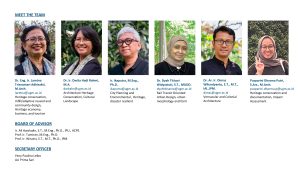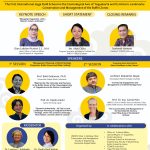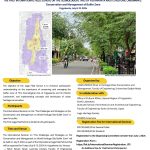
Home
UNESCO Chair in Heritage Cities Conservation and Management
UNESCO Chair in Heritage Cities Conservation has been created in Engineering Research and Innovation Center/ERIC, Faculty of Engineering, Universitas Gadjah Mada.
DR. Laretna T. Adishakti and DR. Dwita Hadi Rahmi have been appointed as Chair holders.
A heritage city colored by living heritage and somehow the new lifestyles created within heritage places. Heritage is intrinsically part of the city environment, to which the conservation of the historic urban landscape should be holistically managed. Urban heritage conservation is not just about the past, but more about holistic approaches for natural, cultural (tangible and intangible). Management of continuity admits change is the central concept of conservation. Universitas Gadjah Mada (UGM) is well and uniquely positioned to assume the UNESCO Chair appointment in Heritage Cities Conservation and Management. Most visibly over the past two decades, UGM will share how heritage cities can balance the conundrum of heritage, ecology, and creative economy as it aims to create vibrancy to rejuvenate itself and highlights elements that root a citizen and give a sense of continuity and belonging. UGM will continue develop education, research, and outreach programs on heritage cities both domestically and overseas, through collaborations with universities across the world, policymakers and governmental entities, bilateral organizations, civic societies, private sectors, and communities. The UNESCO Chair appointment would augment those programs whilst paving a multitude of new avenues for sustained collaborations, including and most importantly with the UNESCO and other UNESCO Chairs.
Objectives
- Foster the good governance, heritage leadership, qualified experts, credible heritage community engagement and mediators in conserving and managing heritage cites by providing the interdisciplinary capacity-buildings, collaborative case study research, and outreach programs through cross-departmental courses, inter-heritage organizations, inter-universities across the globe and networking among local governments as well as alumni of Faculty of Engineering UGM (KATGAMA).
- Manage dynamic discourse and dissemination of heritage cities conservation and management, continue, and expand on-going international exchange programs through field schools, summer courses, conferences, seminars/webinar/workshop, podcast, and all documentation and publication of those programs will be shared widely through a web-based/digital platform.
- Strengthen the utilization of the Omah UGM (a rehabilitated traditional Javanese House post-earthquake owned by UGM) in the Kotagede Heritage District, Yogyakarta Special Territory as a Center for Disaster Risk Management for Heritage Cities
- Working closely with UNESCO, other UNESCO Chairs and promotes the resources, tools, techniques, and approaches recommended in the UNESCO Competence Framework for Cultural Heritage Management: A User Guide to Essential Skills and Knowledge for Heritage Practitioners. UN Sustainable Development Goals, New Urban Agenda, Historic Urban Landscape, Fukuoka Outcomes, ICOMOS – Heritage and the Sustainable Development Goals: Policy Guidance for Heritage and Development Actors, as well as other existing approaches.
Activity Report Unesco Chair 2024 in Bahasa Indonesia:
Laporan Kegiatan UGM-UNESCO Chair HCCM




